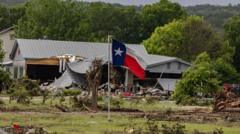On Thursday, SpaceX's Starship rocket exploded shortly after launch, marking its second consecutive mission failure. The incident resulted in grounded flights across several airports in Florida due to safety warnings, and authorities tracked falling debris as the largest spacecraft ever created disintegrated during ascent.
SpaceX Rocket Explosion Triggers Safety Warnings and Flight Delays

SpaceX Rocket Explosion Triggers Safety Warnings and Flight Delays
A SpaceX rocket explosion in Texas raises safety concerns as debris rains down in the Caribbean.
The 123-meter (403-foot) Starship, central to Elon Musk's vision of interplanetary travel, departed from Texas but experienced a "rapid unscheduled disassembly," causing loss of contact with the ground. Fortunately, no injuries or damages have been reported, though witnesses in the Caribbean saw fiery debris cascading from the sky.
This was the eighth test of the Starship program, following another flawed attempt in January, which similarly led to airport delays due to concerns of falling wreckage. The Super Heavy booster part of this mission successfully returned to the launch pad, indicating some operational success amid the overall failure.
SpaceX has begun coordination with safety officials for necessary contingency measures and will analyze data to investigate the cause of the recent explosion. Despite the setbacks, the company remains committed to learning from each incident, emphasizing that failures should yield valuable lessons to improve the rocket's reliability.
In light of the explosion, the Federal Aviation Administration (FAA) confirmed that several flights at Miami and Orlando airports were affected, with delays prompted by the incident.
As debris from the rocket fell in the Bahamas, local authorities advised residents to seek shelter. Meanwhile, the FAA previously grounded Starship launches in January after a similar incident that led to property damage in the Turks and Caicos Islands.
SpaceX's Starship program aims to create fully reusable spacecraft capable of long missions to the Moon and Mars, including transporting humans as part of NASA's Artemis missions. Despite the setbacks, Musk's aspirations for interplanetary endeavors remain steadfast, as he and SpaceX continue to push the boundaries of modern space exploration.
This was the eighth test of the Starship program, following another flawed attempt in January, which similarly led to airport delays due to concerns of falling wreckage. The Super Heavy booster part of this mission successfully returned to the launch pad, indicating some operational success amid the overall failure.
SpaceX has begun coordination with safety officials for necessary contingency measures and will analyze data to investigate the cause of the recent explosion. Despite the setbacks, the company remains committed to learning from each incident, emphasizing that failures should yield valuable lessons to improve the rocket's reliability.
In light of the explosion, the Federal Aviation Administration (FAA) confirmed that several flights at Miami and Orlando airports were affected, with delays prompted by the incident.
As debris from the rocket fell in the Bahamas, local authorities advised residents to seek shelter. Meanwhile, the FAA previously grounded Starship launches in January after a similar incident that led to property damage in the Turks and Caicos Islands.
SpaceX's Starship program aims to create fully reusable spacecraft capable of long missions to the Moon and Mars, including transporting humans as part of NASA's Artemis missions. Despite the setbacks, Musk's aspirations for interplanetary endeavors remain steadfast, as he and SpaceX continue to push the boundaries of modern space exploration.




















